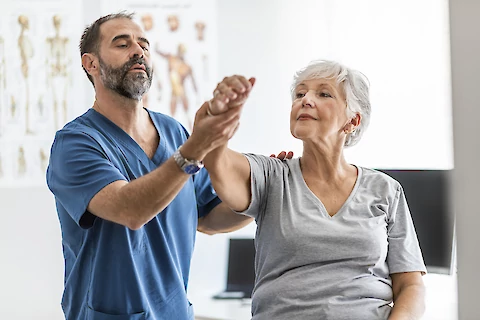
Osteoporosis is a serious condition, and one that many people face as they age. When the human body can't rebuild bone tissue as quickly as it's naturally depleted, the skeletal system becomes more vulnerable to breaks. That means even minor slips and falls can sideline seniors for months, or potentially impact their mobility long-term.
Here are some key tips for combatting osteoporosis. They may be simple, but they're essential for long-term independence and wellness.
1. Take medications and supplements as prescribed
Seniors who have been diagnosed with osteoporosis have likely been given prescription medication to minimize bone loss. These might include weekly or monthly pills such as alendronate or risedronate, or intravenous infusions of ibandronate or zoledronic. Doctors may suggest their patients take prescription-strength daily supplements of calcium and Vitamin D, and multivitamins containing the following:
- Boron
- Vitamin C
- Magnesium
- Vitamin K
- Zinc
Osteoporosis patients should prioritize their daily medication and supplement routine, and get help from a reliable friend, family member, or caregiver ahead of time to ensure they get to their scheduled infusions.
2. Get plenty of exercise
Low-impact resistance training strengthens bones, and regular exercise and stretching promotes balance and agility. People with osteoporosis benefit from the following activities:
- Walking
- Swimming
- Wearing ankle weights
- Using resistance bands
- Weightlifting or resistance machines
- Yoga
- Zumba
- Pickleball
- Stair climbing
- Tai chi
Anyone starting out on a new fitness routine, especially those who have osteoporosis or who have suffered bone breaks in the past, should first consult with their physician. It's also a good idea to enlist the help of a physical therapist or personal trainer to learn the best techniques for new exercise activities.
3. Eat the right foods
It might seem obvious that good nutrition is key to bone health, but there are a few foods that seniors with osteoporosis should consume in moderation. These include some high-oxalate dark leafy greens such as spinach, collard greens, beetroot greens, and Swiss chard. Bok choy and kale have less oxalate, and make good substitutes for occasional enjoyment. Oxalates inhibit the body's ability to use calcium. Legumes, such as peas and soybeans, contain phytates that also block calcium absorption and shouldn't be regular menu items.
And even an alcoholic beverage or two can inhibit bone regeneration, so wine, beer, and spirits should be saved for special occasions. Likewise, seniors with osteoporosis should replace caffeinated beverages with decaf counterparts.
What foods get the green light?
Dairy products such as milk, cheese, and yogurt are excellent sources of calcium, particularly when they're fortified with Vitamin D. Other bone-healthy foods include:
- Salmon
- Seeds and nuts
- Eggs
- Natural fruit juice rich in Vitamin C
- Brassicas, such as cauliflower, broccoli, and bok choy
Osteoporosis patients should ask their orthopedic specialists for a customized list of dietary "dos" and "don'ts" that take into account the person's other prescription medications and supplements.
Bonus tip: Ask for help when needed
People who have trouble remembering their medications, preparing healthy meals, getting adequate exercise, or who have trouble getting to routine infusion appointments might consider enlisting the help of a home care provider. Seniors who live here in the Hilton Head area, including Bluffton and Beaufort, can turn to Senior Helpers for skilled home care services and companionship, without sacrificing their valued independence.